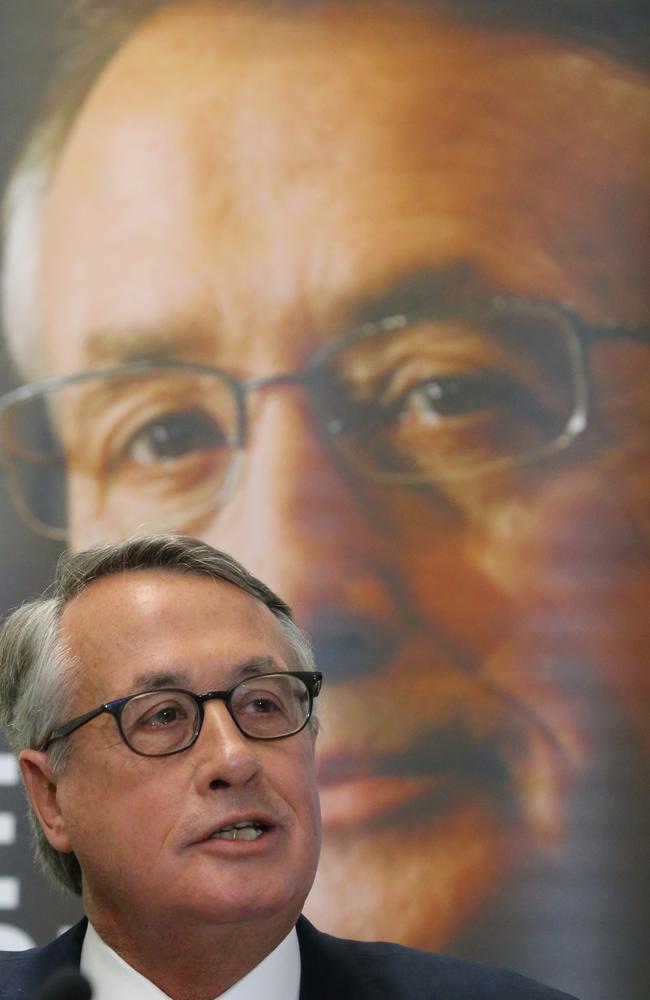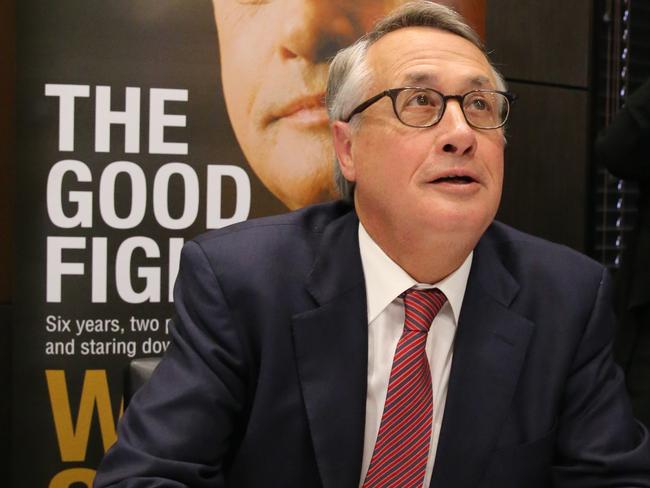Wayne Swan’s memoirs in The Good Fight do not recognise the real secret to Australia’s economic success
OPINION: In its misplaced vanity, Wayne Swan’s memories which have been documented in his new book represent a missed opportunity to reflect upon a crucial part of Australia’s economy.
Economy
Don't miss out on the headlines from Economy. Followed categories will be added to My News.
NO ONE is the repository of all wisdom, as a former Opposition leader once tried to say.
Unless you happen to be Wayne Swan, according to the former Treasurer’s own recollections published this week.
Sensing an obvious gap in the political memories market (irony alert!) Swan has penned a defensive and boastful tome “The Good Fight”, which might as well be titled: “How I saved you ungrateful bastards from the breadline.”
It’s Swan’s account of the heroic lengths he went to in 2008 to single-handedly save Australia from economic damnation.
Starting with a phone call he received on 10 January 2008 from US Treasury Secretary, Hank Paulson, Swan progressively builds a one-eyed account of how he alone was the first to grasp the seriousness of the subprime mortgage crisis unfolding in the United States.
At every turn, Swan emphasises his own contribution, while admonishing key players for their lack of foresight.
He labels it “extraordinary, and even alarming” that Australia’s Treasury did not use its incoming brief to the Rudd government — drafted in October 2007 — to warn of the global financial crisis that would only truly engulf the world a year later with the collapse of US investment bank Lehman Brothers.
WAYNE SWAN: Gives Kevin Rudd one hell of a rev

His first mention of then Treasury Secretary Ken Henry is a derisory comment that he was “never more comfortable than in a double-breasted suit” (Henry and key Treasury staff get a cursory thanks in the acknowledgments section).
Like a fish out of water — a humble boy from the Sunshine Coast — Swan appears awe-struck by his own precipitous rise to power and keen to find a narrative to justify his own merits. The book reads like a job application in reverse from a chronically insecure man who never truly felt comfortable in the job of Treasurer.
In its misplaced vanity, Swan’s memories represent a missed opportunity to reflect upon the importance of Australia’s independent economic institutions in accounting for our economic success.
In a more modest telling, Australia’s ability to survive the GFC relatively unscathed is testimony more to the strength of those institutions, than the political skills of Treasurer Swan.
Sure, Swan worked long hours during this difficult time, taking advice and convening meetings of key officials. He’s right, too, that 2008 marked Labor’s strongest period of economic management.
Crises are often the making of governments. The Ukraine aeroplane disaster revealed the hidden strengths of the Abbott government. Likewise, the GFC gave the new Labor government an opportunity to channel the frenetic energy of Kevin 07 into something useful and move on and move on from policy flops like Fuel Watch, Grocery Watch and set top boxes for pensioners.
But undersold in Swan’s account of the his handling of the GFC is the significant help he received throughout.

At Treasury, Ken Henry brought not only a sharp-eye for a suit, but invaluable institutional memory of the early 1990s recession and how a failure to act can lead to double digit joblessness.
It was Henry who began briefing Swan on the seriousness of the evolving US subprime crisis from early 2008.
It was Henry who first put a figure on the magnitude of the initial stimulus required: $10 billion package.
It was Henry who said “go early, go hard, go households”, leading to $1000 cheques winging their way to 2 million families and 4 million pensioners before Christmas.
A second stimulus package in early 2009 had more of the fingerprints of Kevin Rudd about it, weighing in at $40 billion for infrastructure and ill-administered programs like school halls and home insulation.
Over at the Reserve Bank, governor Glenn Stevens also acted quickly and decisively.
In October 2008 — a full month before Lehman brothers collapsed — Stevens and his team began cutting interest rates, by 25 basis points at first, and then a whopping 100 basis points in September.
Ken Henry and Glenn Stevens: these two men had as much to do with Australia’s successful response to the GFC as Wayne Swan.
Swan’s true wisdom as Treasurer lay in listening to his trusted advisers when the times most called for it.
Indeed, our Westminster system of government works best when our politicians listen to the frank and fearless advice of their bureaucrats and then draw on this knowledge to sell important reforms to the public.

This served Australia well during the GFC. But this orderly business of government would later be destroyed under the Rudd government.
After the GFC, the Labor government — including Swan — failed to sell big their reforms on carbon and mining taxes. Meanwhile, they spent huge sums on education, health, disabilities and broadband.
Sadly, their successors are proving little more adept at government.
Tony Abbott, together with Joe Hockey, have constructed a radically unpopular budget. To make matters worse, Abbott has sacked the head of Treasury, Martin Parkinson, who brings decades of experience in Treasury to the table.
When the next financial crisis hits, Australia will not have access to the same depth of institutional memory that served us so well in 2008.
No one is the repository of all wisdom, but when it comes to the economy, Treasury and the Reserve Bank are the closest things we have.
Abbott will one day discover, to his chagrin, that the quality of advice from our key economic institutions can make or break a government.
Originally published as Wayne Swan’s memoirs in The Good Fight do not recognise the real secret to Australia’s economic success


